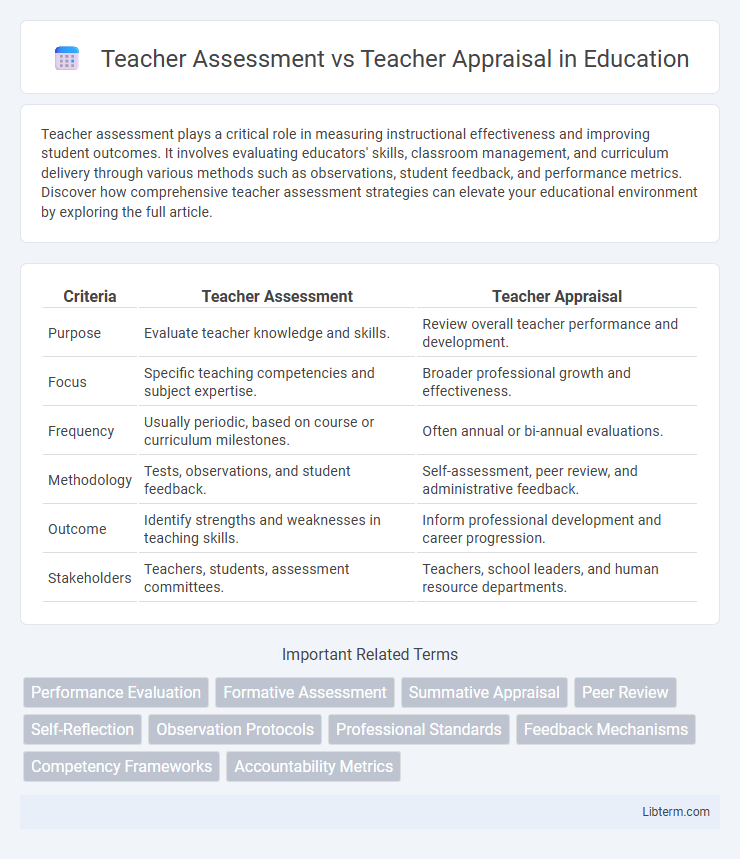Teacher assessment plays a critical role in measuring instructional effectiveness and improving student outcomes. It involves evaluating educators' skills, classroom management, and curriculum delivery through various methods such as observations, student feedback, and performance metrics. Discover how comprehensive teacher assessment strategies can elevate your educational environment by exploring the full article.
Table of Comparison
| Criteria | Teacher Assessment | Teacher Appraisal |
|---|---|---|
| Purpose | Evaluate teacher knowledge and skills. | Review overall teacher performance and development. |
| Focus | Specific teaching competencies and subject expertise. | Broader professional growth and effectiveness. |
| Frequency | Usually periodic, based on course or curriculum milestones. | Often annual or bi-annual evaluations. |
| Methodology | Tests, observations, and student feedback. | Self-assessment, peer review, and administrative feedback. |
| Outcome | Identify strengths and weaknesses in teaching skills. | Inform professional development and career progression. |
| Stakeholders | Teachers, students, assessment committees. | Teachers, school leaders, and human resource departments. |
Understanding Teacher Assessment: An Overview
Teacher assessment refers to the systematic process of evaluating educators' instructional practices and student learning outcomes to enhance teaching effectiveness and professional growth. It incorporates various methods such as classroom observations, student performance data, and self-evaluation to provide comprehensive feedback. Understanding teacher assessment helps in identifying strengths and areas for improvement, promoting reflective practice, and supporting targeted professional development.
Defining Teacher Appraisal in Education
Teacher appraisal in education refers to a systematic process of evaluating a teacher's performance, effectiveness, and professional growth through observation, feedback, and assessment tools. It aims to identify strengths, areas for improvement, and the impact on student learning outcomes by analyzing teaching methods, classroom management, and curriculum delivery. Unlike teacher assessment, which often serves to measure specific competencies or skills, teacher appraisal encompasses a broader review tied to professional development and career advancement.
Key Differences Between Assessment and Appraisal
Teacher assessment primarily evaluates instructional effectiveness and student learning outcomes based on predefined standards, while teacher appraisal focuses on overall professional performance including conduct, collaboration, and development. Assessment uses quantitative data such as test scores and classroom observations, whereas appraisal incorporates qualitative feedback from peers, supervisors, and self-reflection. These differences highlight assessment's role in measuring teaching impact compared to appraisal's comprehensive evaluation of educator competencies and growth.
Objectives of Teacher Assessment
Teacher assessment focuses on evaluating instructional effectiveness, student learning outcomes, and professional development needs to enhance teaching quality. It involves systematic observation, feedback, and data analysis to identify strengths and areas for improvement in pedagogical practices. These assessments aim to support teachers' growth, improve curriculum delivery, and ensure alignment with educational standards.
Purposes of Teacher Appraisal
Teacher appraisal primarily aims to evaluate teacher performance to improve instructional quality and student learning outcomes. It serves as a basis for professional development, promoting accountability and identifying areas for growth. Effective teacher appraisal systems align with educational standards and support career progression.
Methods Used in Teacher Assessment
Teacher assessment primarily employs formative methods such as classroom observations, self-assessments, peer reviews, and student feedback to evaluate teaching effectiveness and promote professional growth. These methods emphasize continuous development by providing constructive insights into instructional strategies, classroom management, and student engagement. In contrast to summative appraisal, assessment techniques focus on qualitative and reflective data rather than solely on performance metrics or standardized evaluations.
Tools and Techniques for Teacher Appraisal
Teacher appraisal utilizes a variety of tools and techniques such as classroom observations, student performance data analysis, peer reviews, and self-assessment questionnaires to evaluate teaching effectiveness comprehensively. Performance checklists, rating scales, and video recordings are employed to provide objective evidence, while feedback sessions and goal-setting meetings facilitate continuous professional development. Incorporating 360-degree feedback and digital platforms enhances the accuracy and transparency of teacher appraisal processes.
Impact on Professional Development
Teacher assessment emphasizes ongoing feedback and reflective practices, fostering continuous professional growth and skill enhancement. Teacher appraisal often involves formal evaluations tied to performance metrics and accountability, influencing career progression and targeted training opportunities. Both processes critically shape professional development by identifying strengths and areas for improvement in teaching effectiveness.
Challenges in Implementing Teacher Assessment and Appraisal
Challenges in implementing teacher assessment and appraisal include inconsistent evaluation criteria, which often lead to subjective judgments and reduced reliability across different assessors. Limited training for evaluators hampers the ability to accurately measure teaching effectiveness and provide constructive feedback. Furthermore, resistance from teachers due to perceived high stakes and lack of collaborative dialogue undermines the overall success of both assessment and appraisal systems.
Best Practices for Effective Teacher Evaluation
Teacher assessment and teacher appraisal both aim to improve instructional quality, though assessment emphasizes ongoing feedback while appraisal often involves summative judgments. Best practices for effective teacher evaluation include using multiple data sources such as classroom observations, student performance metrics, and peer reviews to provide a comprehensive view. Incorporating clear criteria aligned with educational standards and offering constructive feedback fosters professional growth and enhances teaching effectiveness.
Teacher Assessment Infographic

 libterm.com
libterm.com